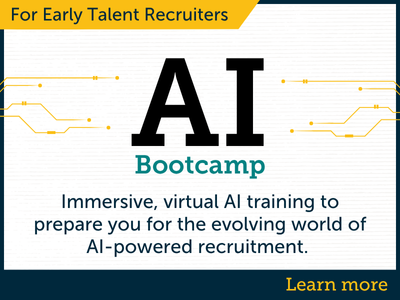Spotlight for Recruiting Professionals
Eaton Vance’s 10-week summer internship program is designed to provide incoming undergraduate seniors with the opportunity to develop and strengthen technical, professional, and interpersonal skills. Its value as a recruiting tool is evident in the attention the firm dedicated to its transition to virtual last spring and its management last summer.
A pipeline for entry-level talent across the firm, Eaton Vance’s internship program most notably converts interns to full-time employees in its research associate and mutual fund services representative programs. The internship program encompasses the following:
- Training—Interns participate in an immersive orientation, taking training courses that range from an overview of the mutual fund industry to an insider’s view of the Eaton Vance affiliates, investment offerings, workplace, and culture.
- Networking—Interns are provided with a unique opportunity to network with employees through Eaton Vance’s “Lunch & Learn” series, which features speakers from across the firm, and through its Diversity & Inclusion Employee Resource Groups.
- Giving Back—Interns participate in two volunteer opportunities with local nonprofits and charitable organizations, including the Boys & Girls Clubs of Boston, the Rose Fitzgerald Kennedy Greenway Conservancy, and Thompson Island.
Prior to the COVID-19 pandemic, Eaton Vance had not hosted virtual internships. In late March, the college talent acquisition team began discussions internally with senior leadership and intern managers to move its internships to virtual in response to the pandemic.
“We wanted to ensure that all managers were on board and prepared for a virtual internship program,” says Jessica Derman, talent acquisition partner.
“By mid-April, the College Talent Acquisition team had created a plan for a virtual internship program. The plan featured new programming, including additional networking, professional development, social activities, and a capstone project. The plan was approved by the senior leadership team in early May.”
Eaton Vance’s College Talent Acquisition and Learning & Development teams identified and implemented several strategies and programming offerings to keep interns engaged and to ensure that managers are equipped to successfully manage their interns virtually. The teams developed the following tools:
- Manager’s guide/handbook—They created a virtual internship best practices guide to prepare managers for a virtual intern. Key areas include clear goals and objectives, well-defined projects and responsibilities, and weekly 1:1 meetings to enhance communication between managers and interns. The guide also includes a comprehensive onboarding checklist.
- Culture—Keeping interns engaged with Eaton Vance’s culture is important. The teams hosted events for the interns during the first week so they could learn about the firm’s culture and structure.
- Onboarding ambassador—A team member was identified by the manager to help provide a positive onboarding experience.
- Lunch & Learn Series—The teams transitioned Eaton Vance’s Lunch & Learn programming to a virtual format and hosted them via Zoom.
- Professional development—In addition to the comprehensive orientation that was delivered to interns virtually, the teams identified a number of remote learning opportunities through Workday Learning to help the interns adapt to a virtual work environment and develop new skills.
- Check-in meetings—The College Talent Acquisition team hosted periodic check-in calls for interns to help them become acclimated to Eaton Vance and answer questions.
- Surveys—Surveys were conducted throughout the internship program to enhance communication, gather feedback, and identify areas in need of improvement.
In addition, at the end of each internship cycle, Eaton Vance sends an internship evaluation survey to both interns and managers, a practice it had in place before the pandemic.
“The results we received from this year were overwhelmingly positive,” Derman says.
“Interns truly appreciated the effort we put into making the internship a substantial and comprehensive experience despite the virtual nature. They particularly enjoyed the learning and development and networking events that allowed them to feel more connected to Eaton Vance and its culture. The managers appreciated the support we offered them when preparing for their virtual interns.”
The two main challenges that interns and managers reported were technological difficulties and having a harder time forming connections in the virtual setting. Overall, however, things ran very smoothly, notes Sam Gignac, talent acquisition specialist-college.
“Due to the changes and improvements we made to the programming,” Gignac says, “we were able to be more intentional in creating opportunities for bonding and networking to give interns the opportunity to connect with employees across the firm. For the most part, the technology difficulties were small and did not seriously impact the intern experience.”
Support from the senior leadership team was a key factor in moving forward with the internship program.
“If the decision was made to eliminate the internship program, we would have lost a strong pipeline of intern candidates for upcoming entry-level roles,” Derman says.
“We know it would have taken years to rebuild our strategy and branding efforts with many schools and external partnerships, which has significantly progressed over the past several years. The summer internship program is also an integral component of our diversity and inclusion strategy.”
Derman and Gignac indicate that they have learned several valuable lessons from this experience.
First, they note that communication and transparency with the incoming interns and managers was key to the successful transition to virtual. An additional benefit of the added programming allowed the interns to interact with others outside of their departments and make better and stronger relationships across the firm.
“Going forward, we will continue to incorporate this programming into our in-person or virtual internship program,” Derman explains.
“Despite an ever-evolving situation caused by the pandemic, we tried to be as transparent as possible and communicate with both managers and interns as soon as decisions were made. We also learned that it is possible to successfully run an internship program remotely. Although our preference will always be to have our program take place in the office so that the interns are able to meet each other and their teams in person, we know that connections can be made and an effective internship can still be completed in a virtual format.”





